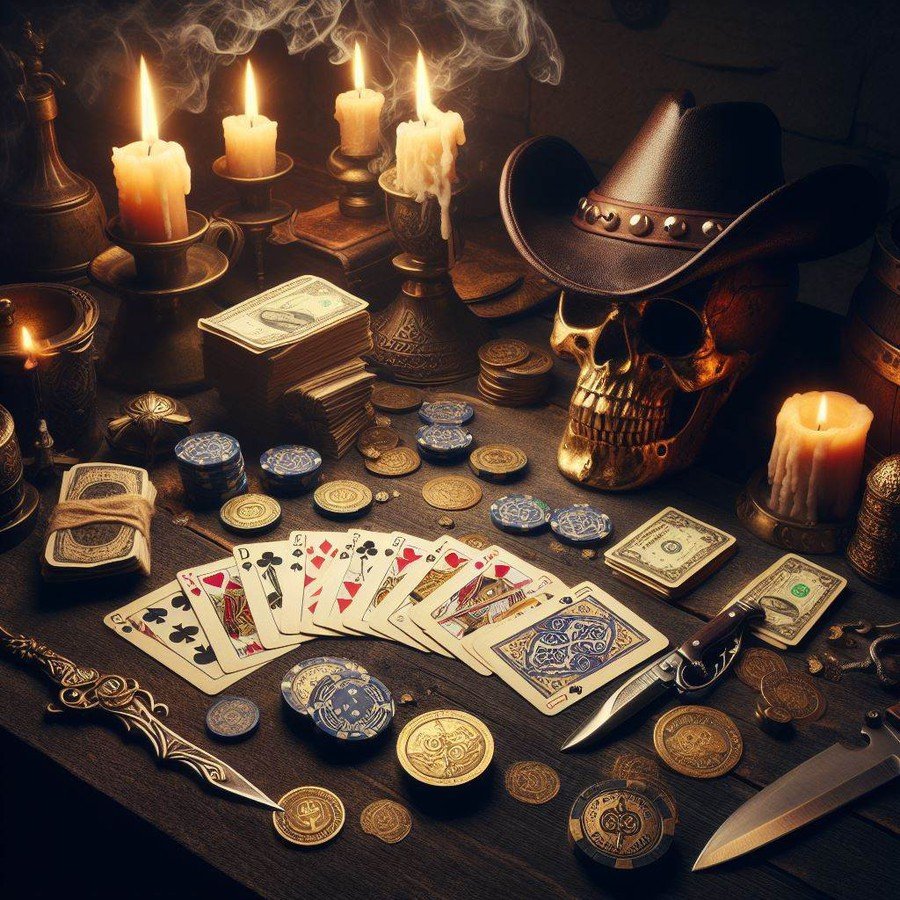As Daniel Negreanu, a six-time WSOP winner, said, any game without the element of luck is dying because if there’s no luck, then the better player will win every single time. This comment caught everyone by surprise at the time, as it was assumed a poker player would be all in favor of skill. Yet this particular one lauded randomness as a good thing. It’s something to think about when considering the mathematics behind Hearthstone.
While trading card games and gambling don't really mix, our friends from LiveCasinoComparer who are experts in decyphering mathematics of gambling games ran an interesting study - or a thought experiment - about the randomness of card games, and they've decided to include Hearthstone as the trading card game example.
Ad
Let’s make matters more interesting. If you were in a medieval tavern, forced to play a game to save your life tonight, and you had a player of slightly lesser skill on the other side, which game would be the wisest choice if you want to see another day? Hearthstone, poker, or blackjack? Choose wisely!
It might help your choice to know that card games that are more about luck are inherently better for bad players, as they are given a chance to win through luck. On the other hand, card games that are less about luck inherently favor the player who took the time to study the game more and get better at it. In this scenario, as you’re the slightly better player, you’d want the game to be less random and more about skill.
So, which game is most about skill - Hearthstone, poker, or blackjack? These three card games really are completely different when it comes to how they play out, and this makes for an interesting read if you’re into probability, randomness, and all that.
We must note that, to even things out, all of these games should be played as a best out of five.
Hearthstone: Deck building makes the difference
• Each player plays with a deck of 30 cards
• Players start with three or four cards
• There's a mulligan phase
• In each game round, a player draws an additional card
Each player plays with a deck of 30 cards. Players start with three or four cards. There’s a mulligan phase. In each game round, a player draws an additional card.
The starting hand in Hearthstone is three cards if you go first or four if you go second, and you can mulligan to get better cards out of 30 cards that are your own deck that you built. Deck building is key here, and it then becomes a matter of luck - who will get the cards they need at precisely the right time, you or your opponent.
We must note that all card draw decks are inherently good because they reduce this variance, or should we say overreliance on being lucky with what card you draw next.
There’s the matter of rock-paper-scissors regarding which deck type you and your opponent chose, so there’s your first random element. Aggro, control, midrange, combo, zoo, tempo, you name it. You know that all of these hold an inherent advantage over some other deck type. Let’s call this part a coin flip. You just can’t know. Half of the time you’ll be at an advantage, and half of the time you’ll be at a disadvantage. Let’s assume you picked a control deck since your life is at stake, you don’t want the casino of a combo deck.
Mulligan, as well as luck throughout the game regarding getting the cards you need, will likely be the main thing that influences the final outcome. If you get the cards you need at exactly the right time, provided you built a decent deck and aren’t at a disadvantage regarding the deck type, you will likely win.
So, while you can influence the outcome - mostly through deck type choice and deck building - the type of deck your opponent chooses is random to you, and the order in which you and your opponent will get cards is random. You can’t play cards you don’t have.
Ad
If you’re one of those players complaining about RNG, our friends from LiveCasinoComparer, who are viewing things from a bird’s perspective and with an unbiased mind, say you are, for the most part, right. TCGs are designed to be random at a one-game level. It’s a game of working your butt off to get a slim advantage.
It wouldn’t work any other way.
Texas Hold'em: Level playing field favors skill
• Played with one deck of 52 cards
• From two to eight players at the table
• Each player is dealt only two cards
• There are five community cards
• Players only make choices regarding bets
Tournament Texas Hold’em Poker is played with one deck of 52 cards. There are a total of five community cards: the flop is the first three, followed by the turn and river. The players, up to eight of them, share the remaining cards, so each could theoretically get a maximum of 5.875 cards but will only ever hold two cards, known as the hole cards. In a game with eight players that went to the river, 21 cards would be used, or 40.38% of the deck.
This makes the whole game fairly predictable. If you know you’re holding a King of Hearts, you know no one else has that card and that there are a maximum of three more Kings elsewhere: unused, dealt to community cards, or dealt to players.
Card counting is not considered a bad thing in Texas Hold’em, it’s a necessity. You constantly have to be making assumptions on what cards are left in the deck, calculate what is the chance that you or your opponent(s) will get the card you need, and what cards your opponents are likely to have. Poker is a game of constant calculations in your head to judge favorable vs unfavorable situations.
A skilled player will likely be able to exploit the weaker player, also known as the fish (because the good player is the shark), regularly. You can farm the lesser players.

Blackjack: Reactions to randomness
• Played with eight decks of 52 cards
• Each player is initially dealt 2 cards
• Player can choose whether to draw more cards or not
• Chance of getting a Blackjack in your first two cards is 4.83%
Of these three games, blackjack has the largest number of cards, as it's commonly played with eight decks of 52 cards for a whopping total of 260 cards in the common 'deck'. However, a key thing to note here is that the shoe is shuffled only once the penetration goes past 50% (most commonly), so after a while you have certain information about what cards are left. Obviously, on blackjack tables with a continuous shuffler this information disappears as the deck of 260 cards is reset for every single hand.
This is where card counting comes from. As you near the penetration of 50%, which means that about 100 or so cards have already been dealt, you have information about the exact composition of the remaining cards. Say, 160 of them. This deck can be skewed one way or the other; it can contain more 'high' cards or more 'low' cards. Ideally, a card counter would know exactly what cards are left, but most settle just for 'high' or 'low'.
Ad
Without that information, blackjack would be - and often is - a completely random game. Any strategy you use is just a response to the randomness that has put you in a more or less favorable position. There is nothing proactive a player can do.
Except when a player is given more tools to work with in his reaction to the cards he's been randomly dealt, such as being allowed to Double Down After Split (DDAS), that is a known favorable blackjack table rule that reduces the house edge by about 0.14% when used properly. Surrender is also a table rule that gives a player more options.
Blackjack remains a reactive game, and a completely random one unless you do card counting to increase your chances to win a given hand, and table rules that give players more choices are important too. So, blackjack can be completely random, or you can have chances to exploit the game, depending on how you approach it.
Regardless of your level of skill, and the opponent's level of skill, it's likely that luck would decide your duel with another blackjack player. Whoever gets better cards, wins. The more decks you use, the more wildly random the game becomes. The more hands you agree to play, the less random the whole game will become but in the end the results will even out towards a coin flip.
Also, once you learn the basic strategy, there's really not much else to learn. Just make decisions that make sense, that's it.
You'd be foolish to play blackjack to save your life.
Conclusion
Blackjack, known as the casino game that is possibly exploitable, isn't really. You can minimize damage and can only do well if you gather more information, through card counting. Poker, on the other hand, is a true skill game, in which randomness only plays a small part to keep the game interesting and fresh with every new hand.
As trading card games are designed to not let any deck type get too strong, you're probably looking at a 55% chance to win at best, with the game itself being random. This isn't as far from a coin flip as we'd like to think, it's just that you had to work really hard to get even that slim advantage. Trading card games are mostly about the thrill of collecting cards and building decks. You have to be really good at it to win consistently.
If you ever find yourself in a tavern, given a choice of three card games to play to save your life, pick poker. You'll exploit a lesser player than yourself easily.





— Комментарии0
Прокомментируйте первым